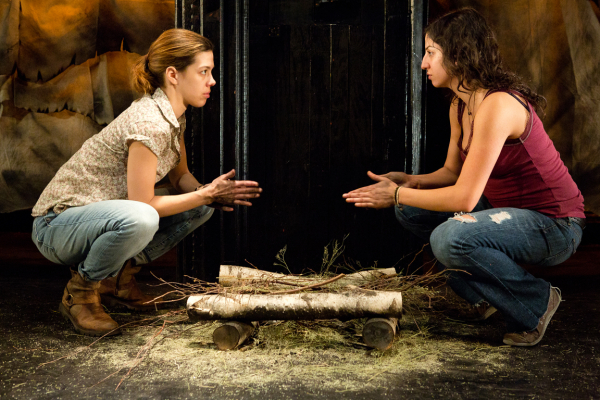My Daughter Keeps Our Hammer

(© Hunter Canning)
There's something distinctly American about Brian Watkins' My Daughter Keeps Our Hammer, directed by Danya Taymor at The Flea Theater. Two sisters live in the frustrating isolation of the Colorado plains with their mother, a pet sheep, and a pickup truck that no one uses. It's also a memory play about frontier days, when people got lost in the wilderness and were never heard of again except in ghost stories. And then of course there's violence, the cruel and vengeful kind. Filled with bleak humor that grows gruesomely darker, My Daughter Keeps Our Hammer fits well into this genre of American literature (think Sam Shepard's True West), yet it carves out a chilling little niche for itself. And in the more-than-able hands of Taymor, the play's images of shadow and light haunt the mind like a tale told around a campfire.
Sisters Sarah (Katherine Folk-Sullivan) and Hannah (Layla Khoshnoudi) live in an extremely boring Colorado town with their ailing mother, whom we never meet. Their absent father left behind a brand-spanking-new truck that their mother won't let either of them use "because of sentimental value." Elder Sarah, a hardworking 20-something perfectionist, wants to get her hands on that truck and sell it for tuition money so that she can be something. After all, she can take only so much of cleaning up after Vicky, a sheep that her mother insists on keeping in the house as a pet, despite the endless excrement. And younger sister Hannah, a waitress and rebellious spitfire, would love nothing better than to ditch her old hunk-of-junk car for a new set of wheels. Mom won't allow it, though. Still, the daughters try to make their mother happy by caring for her and Vicky. But one night while preparing a birthday dinner for mom, an accident inadvertently caused by Vicky unleashes a violent rage in the sisters that takes them on a frantic journey across the prairie to hide a dark misdeed.
Brian Watkins packs a lot of storytelling into a little over an hour, and for the most part, he keeps his tale going at a clip with humor and well-paced scenes. His descriptions of violence stand out for their shocking realness, as though he actually witnessed the kind of cruelty that Sarah and Hannah commit. For their part, Folk-Sullivan and Khoshnoudi have wonderful chemistry onstage, despite the fact that they do not speak to each other the entire time. They deliver humorous lines directly to the audience like a pair of standup comics — and the laughs come regularly. But then both ably shift gears and orate like two sibyls revealing some horrible aspect of the American consciousness, a remorseless brutality that hides inside all confined and frustrated hearts.
Director Taymor, niece of director Julie Taymor, teases out the distinctive American elements of the story. The play begins with shadows (as if from the past) cast upon rough-hewn curtains that obliquely recall animal hides. Folk-Sullivan's eerie silhouette shifts across them like a menacing phantom of the plains as she tells the story of her grandmother who was lost years ago. The music that's piped in now and then also evokes Native tribal rhythms, as though the sisters are conjuring their memories and making them into modern myths. And then there's a pyre, which Hannah and Sarah put together piece by piece throughout the play. Its significance becomes clear only at the end, but building it as they do creates a tension and anticipation that keeps the audience riveted.
Throughout My Daughter Keeps Our Hammer, there is a sense of claustrophobia (well suited to The Flea's black box theater), especially when the sisters stand close and approach the audience like two trapped coyotes, and we feel as confined as they must. By contrast, the vast expanse of the plains is felt when they stand on opposite ends of the stage, forcing us to look back and forth as they speak. But where do you go when you are trapped in the open? Some, says the play, lash out with a hammer.











